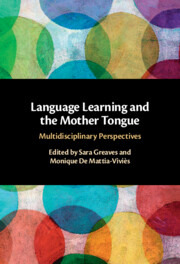Book contents
- Language Learning and the Mother Tongue
- Language Learning and the Mother Tongue
- Copyright page
- Epigraph
- Contents
- List of Contributors and Their Works
- Acknowledgements
- Introduction
- Part I The Mother Tongue and Second Language Learning
- Part II From the Mother Tongue to the Second Mother Tongue
- Part III The Second Mother Tongue as a (M)other Tongue and the Return to the Body
- 7 The Sea of Language
- 8 Samuel Beckett’s Change of Literary Language
- 9 Language, the Brain, and Relating
- Subject Index
- Author Index
- References
7 - The Sea of Language
from Part III - The Second Mother Tongue as a (M)other Tongue and the Return to the Body
Published online by Cambridge University Press: 16 June 2022
- Language Learning and the Mother Tongue
- Language Learning and the Mother Tongue
- Copyright page
- Epigraph
- Contents
- List of Contributors and Their Works
- Acknowledgements
- Introduction
- Part I The Mother Tongue and Second Language Learning
- Part II From the Mother Tongue to the Second Mother Tongue
- Part III The Second Mother Tongue as a (M)other Tongue and the Return to the Body
- 7 The Sea of Language
- 8 Samuel Beckett’s Change of Literary Language
- 9 Language, the Brain, and Relating
- Subject Index
- Author Index
- References
Summary
‘The Sea of Language’ is the first chapter of Volume 1 of a two-volume work entitled Quand Freud voit la mer: Freud et la langue allemande (When Freud Sees the Sea: Freud and the German Language). The author, as writer and translator, explores how the founding tenets of Freudian psychoanalysis are not concepts that happen to have been framed in German, but were derived from the way German parts of speech are rooted in the body and thus grounded in the German language itself, which is not a language of abstraction, as French admirers of German philosophy tend to believe, but of the body in space and in motion, a language of the common people going about their everyday life. The author’s study of the essence of German takes him from poetry to philosophy to the ‘ultimate perversity’: the language of the Third Reich, which he briefly envisages as a return of the repressed within the German language, possibly intuited by Freud. Through his analysis of German, he illustrates how the character of a language can lend itself to perverse manipulation and how individuals can find themselves rejected by the Mother tongue that had so far nurtured them.
Keywords
- Type
- Chapter
- Information
- Language Learning and the Mother TongueMultidisciplinary Perspectives, pp. 123 - 136Publisher: Cambridge University PressPrint publication year: 2022



